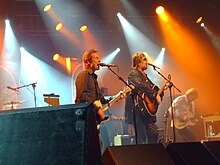Hector (singer)
| Hector | |
|---|---|

Hector (right) on a concert with Pave Maijanen (left) in 2007
|
|
| Background information | |
| Birth name | Heikki Veikko Harma |
| Born |
April 20, 1947 Helsinki, Finland |
| Origin | Helsinki, Finland |
| Genres | Suomirock, folk rock |
| Occupation(s) | singer, songwriter |
| Instruments | guitar |
| Years active | 1965–present |
Heikki Veikko Harma (born April 20, 1947, Helsinki, Finland) is a Finnish singer-songwriter who has also distinguished himself as a translator of song lyrics, but has written popular lyrics of his own too. To the public he's better known by the name Hector, which he has used since the release of his 1965 debut single "Palkkasoturi", a Finnish translation of Buffy Sainte-Marie's "Universal Soldier". His 1974 album Hectorock I became the fastest selling record in Finnish history, selling 50,000 units within a few months. Hector was at the height of his popularity in the first half of the 1970s, but his steady string of recordings provided occasional hits well into the 1990s. In 2000s he made strong comeback to popularity with his album Ei selityksiä. That album became one of his most successful albums. In 2007 he made a farewell tour on big arenas, but has performed occasionally after that too. In 2011 he made a massive comeback tour and released a new album Hauras (Fragile) in 2014, ten years after his previous album.
Hector's musical style is very diverse. He is mainly known of his folk rock songs, but he has also made progressive rock, hard rock and heavy metal songs. He has translated Don McLean, Procol Harum, King Crimson, Neil Young, David Bowie and several other artists in Finnish. Today he is considered, due to his extremely long (51 years) and distinguished career as one of the both pioneers and mainstays of Suomirock. His lyrics have often a political and/or social component.
Some of Hector's songs are considered classics of Finnish popular music, such as "Lumi teki enkelin eteiseen" (Snow made an angel in the lobby), "Mandoliinimies" (Mandolin man) and "Olen hautausmaa" (I am a graveyard), and he can be considered a primary contributor to Finnish rock music of the 1970s. He has also written song lyrics to other Finnish singers. His song "Juodaan Viinaa" (Let's drink spirits) was covered by Finnish folk metal band Korpiklaani on their 2009 album "Karkelo."
...
Wikipedia
